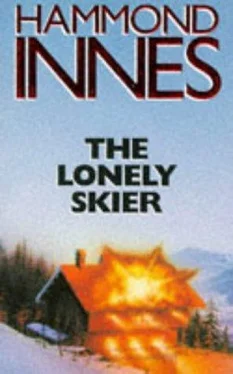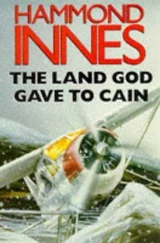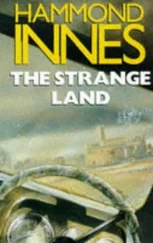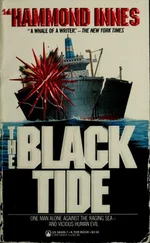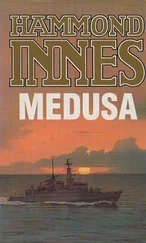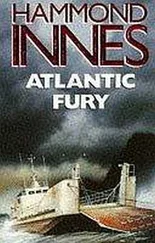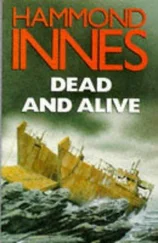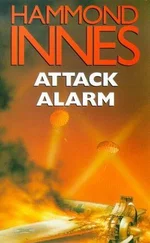Hammond Innes - The Lonely Skier
Здесь есть возможность читать онлайн «Hammond Innes - The Lonely Skier» весь текст электронной книги совершенно бесплатно (целиком полную версию без сокращений). В некоторых случаях можно слушать аудио, скачать через торрент в формате fb2 и присутствует краткое содержание. Жанр: Прочие приключения, на английском языке. Описание произведения, (предисловие) а так же отзывы посетителей доступны на портале библиотеки ЛибКат.
- Название:The Lonely Skier
- Автор:
- Жанр:
- Год:неизвестен
- ISBN:нет данных
- Рейтинг книги:3 / 5. Голосов: 1
-
Избранное:Добавить в избранное
- Отзывы:
-
Ваша оценка:
- 60
- 1
- 2
- 3
- 4
- 5
The Lonely Skier: краткое содержание, описание и аннотация
Предлагаем к чтению аннотацию, описание, краткое содержание или предисловие (зависит от того, что написал сам автор книги «The Lonely Skier»). Если вы не нашли необходимую информацию о книге — напишите в комментариях, мы постараемся отыскать её.
The Lonely Skier — читать онлайн бесплатно полную книгу (весь текст) целиком
Ниже представлен текст книги, разбитый по страницам. Система сохранения места последней прочитанной страницы, позволяет с удобством читать онлайн бесплатно книгу «The Lonely Skier», без необходимости каждый раз заново искать на чём Вы остановились. Поставьте закладку, и сможете в любой момент перейти на страницу, на которой закончили чтение.
Интервал:
Закладка:
‘Snow’s drifted up here,’ came Mayne’s voice from above. ‘Have to take our skis off soon.’
A few feet higher up I saw the first sign of rock. It was a small outcrop, smooth and ice-rounded. Then I was up with Mayne. The slope was less now. I stood up and looked about me, blinking my eyes in the sunlight. We were standing on the rim of a great white basin. The snow simply fell away from under our feet. The slope up which we had climbed fanned out and mingled with the avalanche slopes that came in from either side. I could scarcely believe that those were our ski marks climbing up out of the basin — the tracks showed clearly like a little railway line mapped out on white paper.
I looked ahead of us. There was nothing but smoothed rock and jagged tooth-like peaks. ‘That’s Popena,’ Mayne said, pointing to a single peak rising sharply almost straight ahead of us. ‘The track runs just under that to the left.’ The sun was cold — the air strangely visible, like a white vapour. It was a cold, rarefied air and I could feel my heart pumping against my ribs.
A little further on, we removed our skis. It was just drift snow here and, with our skis over our shoulders, we made steady progress, choosing the rock outcrops and avoiding the drifts.
At last we stood at the top of the pass.
The main peaks were still above us. But they only topped our present position by a few hundred feet. We were looking out upon a world of jumbled rocks — black teeth in white gums of snow. It was cold and silent. Nothing lived here. Nothing had ever lived here. We might have been at one of the Poles or in some forgotten land of the Ice Age. This was the territory of Olympian Gods. The dark peaks jostled one another, battling to be the first to pierce the heavens, and all about them their snow skirts dropped away to the world below, that nice comfortable world where human beings lived. ‘Wesson should bring his camera up here,’ I said, half to myself.
Mayne laughed. ‘It’d kill him. He’d have heart failure before he got anywhere near the top.’
It was cold as soon as we stood still. The wind was quite strong and cut through our windbreakers. It drove the snow across the rocks on which we stood like dust. It was frozen, powdery snow. I could sift it through my gloved hands like flour. Here and there along the ridges a great curtain of it would be lifted up by the wind and would drift across the face of the rock like driven spume. There was no sign of the blue sky that had looked so bright and gay from Col da Varda. The air was white with light.
Mayne pointed to the great bulk of Monte Cristallo. The sky had darkened there and the top of the mountain was gradually being obscured as though by a veil. The sun was only visible as an iridescent light. ‘Going to snow soon,” he said. ‘Better be moving. I’d like to get across the glacier before it comes on thick. Later it doesn’t matter. We’ll be in the pass. If it looks bad after lunch, we’d better come back by Lake Misurina.’
He was so confident and I was so reluctant to face the steep descent into that basin that I raised no objection to going forward. Soon we reached the glacier and put on our skis. It was very little different to the rock slopes that encompassed it, for it was covered with a blanket of snow. Only here and there was there any sign of the ice that formed the foundation for the snow. The going was much easier now. The slope was quite gentle and our skis slid easily across the snow with only an occasional thrust of our sticks. The brightness slowly dimmed and the sky became heavy and leaden. I did not like the look of it. You feel so small and unimportant up there in the mountains. And it’s not a pleasant feeling. You feel that one rumble of thunder and the elements can sweep you out of existence. One by one the peaks that surrounded the glacier in a serrated edge were blotted out.
We were barely halfway across the glacier when it began to snow. At first it was just a few flakes drifting across our path in the wind. But it grew rapidly thicker. It came in gusts, so that one moment it was barely possible to see the edges of the glacier and the next it was almost clear, so that it was possible to see the encircling crests that swept upwards to bury their peaks in the grey sky.
Mayne had increased the pace, I became very conscious of the pounding of my heart. Whether it was the continued exercise at that altitude or nervousness I do not know. Probably both. In all that world of grey and white, the only friendly thing was Mayne’s back and the slender track of his skis that seemed to link us like a rope across the snow.
At last we were across the glacier. The snow was falling steadily now, a slanting, driven fall that stung the face and clung to the eyes. The slope became steeper. We began to travel fast, zig-zagging down through tumbled slopes of soft, fresh snow. It became steeper still and the pace even faster.
I kept in the actual track of Mayne’s skis. Sometimes I lost sight of him in the snow. But always there were the ski tracks to follow. The only sounds were the steady hiss of driven snow and the friendly biting sound of my skis. I followed blindly. I had no idea where we were going. But we were going downhill and that was all I cared. How Mayne managed to keep a sense of direction in that murk I do not know.
I suddenly found him standing still, waiting for me. His face was hardly recognisable, it was so covered in snow. He looked like a snowman. ‘It’s coming on thick,’ he said as I came up to him. ‘Have to increase the pace. Is that all right with you?’
‘That’s all right,’ I said. Anything so long as we got down as quickly as possible. The smoke of our breath was whipped away by the wind.
‘Stick to my tracks,’ he said. ‘Don’t diverge or we’ll lose touch with each other.’
‘I won’t,’ I assured him.
‘It’s good, fast going now,’ he added. ‘We’ll be out of the worst of it soon.’ He stepped back into his tracks where they finished abruptly and pushed off ahead of me again.
I was a bit worried as we started off, for I did not know how much better Mayne was as a skier than myself. And skiing across fresh snow is not the same as skiing down one of the regular runs. The ski runs are flattened so that you can put a brake on your speed by snow-ploughing — pressing the skis out with the heels so that they are thrusting sideways with the points together, like a snow-plough. You can stem, too. But in fresh snow, you can’t do that. You adjust your speed by varying the steepness of the run. If a slope is too steep for you, you take it in a series of diagonals. You can only go fast and straight on clean snow if you can do a real Christi — and the Christiana turn is the most difficult of all, a jump to clear the skis from their tracks and a right angle turn in mid-air.
I mention this because it worried me at the time. I have never got as far in skiing as the Christiana turn and, if Mayne could Christi, I wandered if he would realise that I could not. I wished I had mentioned the fact to him when he suggested increasing the pace.
But soon my only concern was to keep my skis in his tracks. We were going in an oblique run down the shoulder of a long hill. Mayne was taking a steep diagonal and we were running at something over thirty miles an hour through thick, driving snow. It is not an experience I wish to repeat. I could have followed the line of his skis on a gentler run and zig-zagged down to meet it when I got too far above his line. But that would slow my pace and I did not dare fall too far behind. As it was, the snow was quite thick in his tracks by the time I followed on. In places they were being half obliterated in a matter of seconds.
The snow whipped at my face and blinded my eyes. I was chilled right through with the cold and the speed. In places the snow was very soft and Mayne’s skis had bitten deep into it. This made it difficult for me at times to retain my balance.
Читать дальшеИнтервал:
Закладка:
Похожие книги на «The Lonely Skier»
Представляем Вашему вниманию похожие книги на «The Lonely Skier» списком для выбора. Мы отобрали схожую по названию и смыслу литературу в надежде предоставить читателям больше вариантов отыскать новые, интересные, ещё непрочитанные произведения.
Обсуждение, отзывы о книге «The Lonely Skier» и просто собственные мнения читателей. Оставьте ваши комментарии, напишите, что Вы думаете о произведении, его смысле или главных героях. Укажите что конкретно понравилось, а что нет, и почему Вы так считаете.
